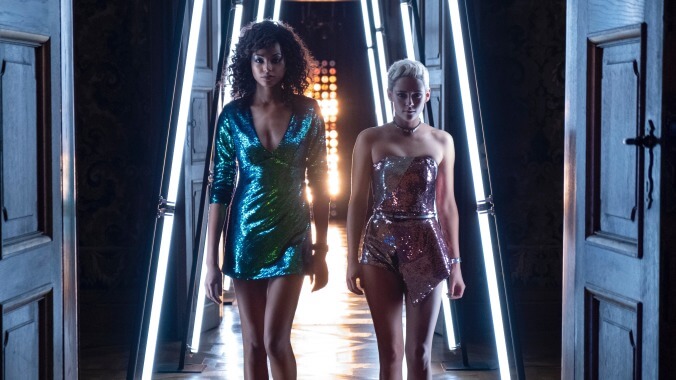Kristen and Patrick Stewart aren’t related, but they are the best part of Charlie’s Angels

Each successive incarnation of Charlie’s Angels reflects the state of pop feminism in the decade of its release. First came the original 1970s TV version, with its twin peans to women’s lib and sexual objectification; then the early ’00s reboot, less tailored toward the male gaze but still focused on a commercial facsimile of feminism that promised women could have their lip gloss and kick ass too. With that in mind, it’s appropriate that writer-director Elizabeth Banks describes the new Charlie’s Angels as a continuation of the ’00s series rather than a reboot, given that her new movie offers up a similar variety of what can be described as Splenda feminism: sweet enough in the moment, but ultimately a low-calorie substitute for the real thing.
There are a few refreshing story details that make it clear that this is the first Charlie’s Angels to be written and directed by a woman (solely, at least—a handful of women wrote for the ’70s series, and one of the three credited screenwriters on Charlie’s Angels: Full Throttle is a woman). A minor villain meets his fate because he took credit for a more competent woman’s work, and the film plays with the dichotomy between invisible and objectified that drives the (overall superior) Melissa McCarthy vehicle Spy. And by this point in action-movie history, the idea that a woman can be a deadly fighter is no longer a revelation—as long as she does it in high heels, of course. The film tries to have it both ways on the latter point, adding a moment where the Angels change shoes before chasing after bad guys on foot while still including multiple fight scenes in sky-high stilettos.
The basic plot of the film is an origin story reminiscent of another decades-late sequel released earlier this year, Men In Black: International. Both revolve around a brainy female scientist, in this case software engineer Elena Houghlin (Naomi Scott), who’s abruptly plopped into the world of high-stakes espionage, and finds she has a taste for it. Both women are paired up with a cocky veteran agent that originally sees her as a liability, although by the end of the movie she becomes invaluable to the operation. Actually, in this case, there are two veterans: humorless ex-MI6 agent Jane Kano (Ella Balinska), who handles the ass-kicking, and rebellious heiress/possible borderline personality Sabina Wilson (Kristen Stewart), whose recklessness makes her perfect for dangerous undercover work.
Together with their own personal Bosleys (first Djimon Hounsou, then Banks), the three of them set out to recover the gadget Elena’s been working on for clueless tech billionaire Alexander Brock (Sam Claflin). The object in question looks like a combination of an Alexa and a Simon game, and has what’s become a stereotypical power for spy-movie doohickeys: It’s a miraculous perpetual motion machine that would revolutionize the energy industry, but also has the potential to become a super-weapon. This one, when reversed, causes what the movie unhelpfully describes as “brain seizures.”
Despite her demonstrated indifference toward blockbuster work—this is the César award winner’s first big franchise role since the end of the Twilight series in 2012—Stewart looks like she’s having a lot of fun in Charlie’s Angels, practically skipping across the screen with a roguish sideways grin and a mischievous energy. Stewart easily gets the biggest laughs in the film, as in the scene where she wordlessly points to herself with a combination of surprise and pride when Scott makes a crack about “lady spies.” She’s matched, however briefly, by Patrick Stewart in a supporting role as one of the multiple Bosleys that work for Banks’ version of the Townsend Agency, here reimagined as an interconnected international network—rather like the Men In Black, actually. Anyhow, toward the end of the movie, the elder Stewart gets a chance to ham it up. And he does so with a version of the terrifying intensity he brought to his role in Green Room, albeit applied toward much campier ends.
In an inverse of Stewart’s performance—which is playfully realized, but limited in terms of action—Balinska is the most skilled onscreen fighter of the three, as evidenced by the wider shots and longer takes when she fights a baddie one-on-one instead of in a group. In dialogue scenes, however, she’s overshadowed every time, and her joke delivery is leaden compared to that of the Stewarts or even Banks. (Scott is somewhere in between, as befits her bland character.) As a result, both the comedy and the action are only intermittently effective, the latter further hampered by sloppy editing (both visual and auditory) and bad CGI explosions. The overall look of the film has the shiny, empty appearance of a newly rehabbed condo, and the quips about women’s love of cheese and gigantic closets have a similarly hollow sassy-greeting-card feel. But the outfits in those closets, it must be said, are fabulous.